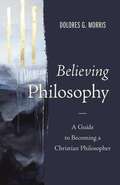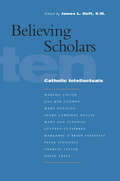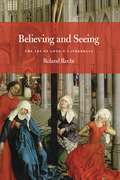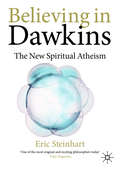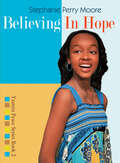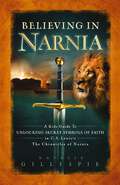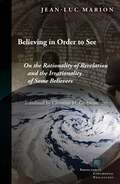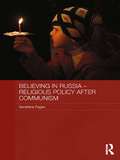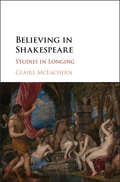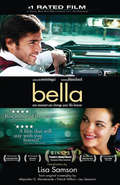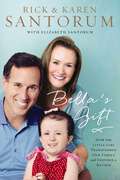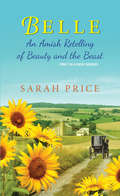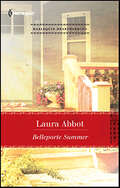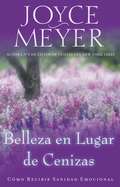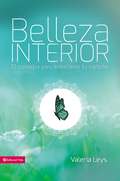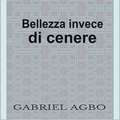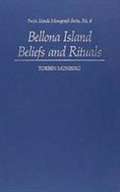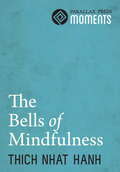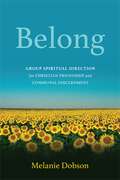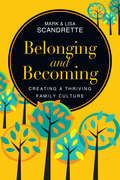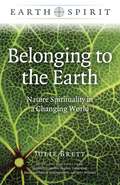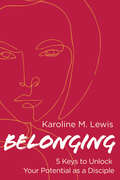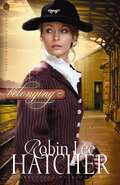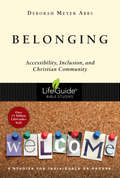- Table View
- List View
Believing Philosophy: A Guide to Becoming a Christian Philosopher
by Dolores G. MorrisBelieving Philosophy introduces Christians to philosophy and the tools it provides believers, helping them understand, articulate, and defend their faith in an age of unbelief.Philosophy has been a part of Christianity since its earliest days, and theistic philosophy predates Christianity by thousands of years. But Christians today often don't realize or are skeptical of all that philosophy can offer them. In Part 1, author Dolores G. Morris explains why Christians should read and study philosophy. She begins with a historical overview of Christian philosophy from the church fathers to contemporary philosophers and then introduces the basic resources of philosophical reasoning: the role and aim of reason, distinctions between truth and reason and provability, and learning to read like a philosopher. These chapters address three foundational questions:What is philosophy?Why should a Christian study philosophy?How should a Christian study philosophy?In Part 2, Morris introduces students to philosophical arguments and questions relevant to Christians. She presents arguments by three key branches of philosophy: metaphysics, epistemology, and practical philosophy. Building on concepts introduced in Part 1, she explains what philosophical arguments are and how they ought to be evaluated from a philosophical and Christian perspective. The following chapters examine specific questions most pressing for Christians today:The problem of evilRationality and faithFree willSkeptical theismThe moral argument for the existence of GodReformed epistemologyEach chapter introduces the problem, explains Christian responses, discusses the strengths and weaknesses of each response, and leaves the final verdict to the reader. Finally, each chapter concludes with a list of recommended further readings.
Believing Scholars: Ten Catholic Intellectuals
by James L. HeftHow do Catholic intellectuals draw on faith in their work? And how does their work as scholars influence their lives as people of faith?For more than a generation, the University of Dayton has invited a prominent Catholic intellectual to present the annual Marianist Award Lecture on the general theme of the encounter of faith and profession. Over the years, the lectures have become central to the Catholic conversation about church, culture, and society.In this book, ten leading figures explore the connections in their own lives between the private realms of faith and their public calling as teachers, scholars, and intellectuals.This last decade of Marianist Lectures brings together theologians and philosophers, historians, anthropologists, academic scholars, and lay intellectuals and critics.Here are Avery Cardinal Dulles, S.J., on the tensions between faith and theology in his career; Jill Ker Conway on the spiritual dimensions of memory and personal narrative; Mary Ann Glendon on the roots of human rights in Catholic social teaching; Mary Douglas on the fruitful dialogue between religion and anthropology in her own life; Peter Steinfels on what it really means to be a “liberal Catholic”; and Margaret O’Brien Steinfels on the complicated history of women in today’s church. From Charles Taylor and David Tracy on the fractured relationship between Catholicism and modernity to Gustavo Gutiérrez on the enduring call of the poor and Marcia Colish on the historic links between the church and intellectual freedom, these essays track a decade of provocative, illuminating, and essential thought. James L. Heft, S.M., is President and Founding Director of the Institute for Advanced Catholic Studies and University Professor of Faith and Culture and Chancellor, University of Dayton. He has edited Beyond Violence: Religious Sources for Social Transformation in Judaism, Christianity, and Islam (Fordham).
Believing and Seeing: The Art of Gothic Cathedrals
by Roland Recht Mary WhittallIn addition to the great cathedrals of France, Recht explores key religious buildings throughout Europe to reveal how their grand designs supported this profusion of images that made visible the signs of scripture. Metalworkers, for example, fashioned intricate monstrances and reliquaries for the presentation of sacred articles, and technical advances in stained glass production allowed for more expressive renderings of holy objects. Sculptors, meanwhile, created increasingly naturalistic works and painters used multi-hued palettes to enhance their subjects' lifelike qualities. Re-imagining these works as a link between devotional practices in the late Middle Ages and contemporaneous theories that deemed vision the basis of empirical truth, Recht provides students and scholars with a new and powerful lens through which to view Gothic art and architecture.
Believing in Dawkins: The New Spiritual Atheism
by Eric SteinhartDawkin's militant atheism is well known; his profound faith less well known In this book, atheist philosopher Eric Steinhart explores the spiritual dimensions of Richard Dawkins’ books, which are shown to encompass:· the meaning and purpose of life· an appreciation of Platonic beauty and truth· a deep belief in the rationality of the universe· an aversion to both scientism and nihilism As an atheist, Dawkins strives to develop a scientific alternative to theism, and while he declares that science is not a religion, he also proclaims it to be a spiritual enterprise. His books are filled with fragmentary sketches of this ‘spiritual atheism’, resembling a great unfinished cathedral. This book systematises and completes Dawkins’ arguments and reveals their deep roots in Stoicism and Platonism. Expanding on Dawkins’ ideas, Steinhart shows how atheists can develop powerful ethical principles, compelling systems of symbols and images, and meaningful personal and social practices. Believing in Dawkins is a rigorous and potent entreaty for the use of science and reason to support spiritually rich and optimistic ways of thinking and living.
Believing in Hope (Yasmin Peace Series #2)
by Stephanie Perry MooreIn this second book of the Yasmin Peace series, family tensions and school unrest soar to a fever pitch. A school counselor begins the LIGHT club, a club dedicated to helping eighth grade girls deal with issues like gangs, depression, teen suicide, and self esteem. Yasmin discovers that there is hope on the other side of every obstacle—if she holds on to her faith.This book reminds us of Yasmin's determination to keep her family together. Even as some situations seem to get worse, she realizes that her hope is in the Lord, and we witness how she learns to rely on Him.
Believing in Hope (Yasmin Peace Series #2)
by Stephanie Perry MooreIn this second book of the Yasmin Peace series, family tensions and school unrest soar to a fever pitch. A school counselor begins the LIGHT club, a club dedicated to helping eighth grade girls deal with issues like gangs, depression, teen suicide, and self esteem. Yasmin discovers that there is hope on the other side of every obstacle—if she holds on to her faith.This book reminds us of Yasmin's determination to keep her family together. Even as some situations seem to get worse, she realizes that her hope is in the Lord, and we witness how she learns to rely on Him.
Believing in Narnia: A Kid's Guide to Unlocking the Secret Symbols of Faith in C.S. Lewis' The Chronicles of Narnia
by Natalie Nichols GillespieShows the Christian message within The Chronicles of Narnia®To coincide with the release of Prince Caspian, this book helps kids ages 7-11, understand the symbolism of the Christian faith written by C.S. Lewis in the Chronicles of Narnia series. Christian concepts are simply explained, along with excerpts from the Narnia books. Each section of the book explains the characters, events, places, and themes and gives insight in the spiritual parallels. Kids, parents, teachers and ministers will all find this to be a great tool for use in preparing to see the movie.
Believing in Order to See: On the Rationality of Revelation and the Irrationality of Some Believers (Perspectives in Continental Philosophy)
by Jean-Luc MarionFaith and reason, especially in Roman Catholic thought, are less contradictory today than ever. But does the supposed opposition even make sense to begin with? One can lose faith, but surely not because one gains in reason. Some, in fact, lose faith when reason is not able to make sense of the experiences of our lives. We very quickly realize that reason does not understand everything. Immense areas remain incomprehensible and irrational, which we abandon to belief and opinion.Soon we definitively renounce thinking what that has been excluded from the realm of the thinkable. Ideological nightmares arise from this slumber of reason. Thus, the separation between faith and reason, too quickly taken as self-evident and even natural, is born from a lack of rationality, an easy capitulatin of reason before what is supposedly unthinkable. Rather than lose faith through excessive rationality, we often lose rationality because faith is too quickly excluded from the realm that it claims to open, that of revelation. We lose reason by losing faith.Examining such topics as the role of the intellectual in the church, the rationality of faith, the infinite worth and incomprehensibility of the human, the phenomenality of the sacraments, and the phenomenological nature of miracles and of revelation more broadly, this book spans the range of Marion’s thought on Christianity. Throughout he stresses that faith has its own rationality, structured according to the logic of the gift that calls forth a response of love and devotion through kenotic abandon.
Believing in Russia - Religious Policy after Communism: Religious Policy After Communism (Routledge Contemporary Russia and Eastern Europe Series)
by Geraldine FaganThis book presents a comprehensive overview of religious policy in Russia since the end of the communist regime, exposing many of the ambiguities and uncertainties about the position of religion in Russian life. It reveals how religious freedom in Russia has, contrary to the widely held view, a long tradition, and how the leading religious institutions in Russia today, including especially the Russian Orthodox Church but also Muslim, Jewish and Buddhist establishments, owe a great deal of their special positions to the relationship they had with the former Soviet regime. It examines the resurgence of religious freedom in the years immediately after the end of the Soviet Union, showing how this was subsequently curtailed, but only partially, by the important law of 1997. It discusses the pursuit of privilege for the Russian Orthodox Church and other ‘traditional’ beliefs under presidents Putin and Medvedev, and assesses how far Russian Orthodox Christianity is related to Russian national culture, demonstrating the unresolved nature of the key question, ‘Is Russia to be an Orthodox country with religious minorities or a multi-confessional state?’ It concludes that Russian society’s continuing failure to reach a consensus on the role of religion in public life is destabilising the nation.
Believing in Shakespeare: Studies In Longing
by Claire McEachernThis ground breaking and accessible study explores the connections between the English Reformation's impact on the belief in eternal salvation and how it affected ways of believing in the plays of Shakespeare. <P><P>Claire McEachern examines the new and better faith that Protestantism imagined for itself, a faith in which scepticism did not erode belief, but worked to substantiate it in ways that were both affectively positive and empirically positivist. Concluding with in-depth readings of Richard II, King Lear and The Tempest, the book represents a markedly fresh intervention in the topic of Shakespeare and religion. With great originality, McEachern argues that the English reception of the Calvinist imperative to 'know with' God allowed the very nature of literary involvement to change, transforming feeling for a character into feeling with one.<P> Explores how belief was understood to operate in early modern England and not simply to study what those beliefs were.<P> Offers a study of the relations between believing in a Shakespeare play and believing in salvation.<P> Delivers a new approach to the study of dramatic irony and suspense in the plays of Shakespeare.
Bella
by Lisa SamsonIf you want God to laugh, tell him your plans.For Jose the cook and Nina the beautiful waitress life has not turned out the way either had planned. Living with the weight of guilt and lost dreams, each struggles to survive and to make sense of what life now holds. But the events of one ordinary day in New York City turn into an unforgettable experience that changes both of their lives forever.Based on the #1 top-rated movie of 2007 and one of the most honored films of the year--winning the highly coveted People's Choice Award at the Toronto Film Festival, Best Picture and Best Actor at the 2008 MovieGuide Awards--Bella is a story about redemption, family and finding love unexpectedly.
Bella's Gift: How One Little Girl Transformed Our Family and Inspired a Nation
by Rick SantorumRick and Karen Santorum's inspiring story of life with Bella, their special-needs youngest child <P><P> Four days after Rick and Karen Santorum welcomed their eighth baby into the world they were given the devastating news that their little girl, Bella, was going to die. The full story of life with Bella has never been told until now. This inspiring family memoir explores what it means to embrace and celebrate the life of each person, and find hope, even in the midst of painful challenges.<P> Bella's Gift is the story of how the entire family came together to love and care for Bella and how God strengthened them during the storms and blessed their family with grace, peace, and joy. <P> Searchingly honest, faith filled, and surprisingly joyful, Bella's Gift is a loving, lived-out testimony to the truth that everyone counts, even "the least of these."
Belle: An Amish Retelling of Beauty and the Beast (An Amish Fairytale #1)
by Sarah Price&“So heartwarming and charming . . . an Amish novel that is a twist on the classic fairy tale Beauty and the Beast . . . beautiful and inspiring.&” —Harlequin JunkieIn author Sarah Price&’s fresh and inspirational retelling of a beloved classic, a dutiful young Amish woman agrees to marry a notorious recluse for her family&’s sake—but the consequences are more than either bargained for . . .To most townsfolk, he&’s known simply as The Beast. Annabelle Beiler has little interest in gossip, but she&’s heard about Adam Herschberger&’s scars and his gruff, solitary ways. Though he sounds like a character from one of Belle&’s treasured books, the man is real and, it turns out, just as unreasonable as the rumors claim. When a buggy accident wipes out the last of her daed&’s money, forcing him to sell their farm, Adam buys it. Then he offers Belle a deal—marry him, and her family can keep their home.Everyone is shocked by Belle&’s decision, but she&’s determined to be a good fraa, cleaning Adam&’s rundown house and tending the overgrown garden. Breaking through her new husband&’s icy reserve will be another matter. Belle&’s courage and strength are abundant, but it will take true faith to guide Adam back to the heart of his Amish community—and to the loving marriage they both deserve.&“This was delightful! Beauty and the Beast is my favorite of the Disney princess stories. This Amish twist on the story was terrific.&” —The Neverending TBR&“An interesting glance into Amish culture with a fairy tale romantic twist.&” —The Alley-Cat7
Belleporte Summer
by Laura AbbotThe first time Laurel Eden sees Belleporte, she realizes it's the perfect place to live. The dreams she's always had can finally come true. Little does she know that this simple decision is going to change everything-for her and for those she loves....The first time Ben Nolan meets Laurel, he realizes she's like no one else he's ever met. If his situation were different, he'd try to get to know her better, but a relationship with Laurel is out of the question. Especially after he uncovers the secret in her past.
Belleza en Lugar de Cenizas: Como Recibir Sanidad Emocional
by Joyce MeyerMany people seem to have it all together outwardly, but inside they are a wreck. Their past has broken, crushed, and wounded them inwardly. They can be healed. God has a plan, and Isaiah 61 reveals that the Lord came to heal the brokenhearted. He wants to heal victims of abuse and emotional wounding. Joyce Meyer is a victim of the physical, mental, emotional, and sexual abuse she suffered as a child. Yet today she has a nationwide ministry of emotional healing to others like herself. In Beauty for Ashes she outlines major truths that brought healing in her life and describes how other victims of abuse can also experience God's healing in their lives. You will learn: * How to Deal with the Emotional Pain of Abuse * How to Understand Your Responsibility to God for Overcoming Abuse * Why Victims of Abuse Often Suffer from Other Addictive Behaviors * How to Grab Hold of God's Unconditional Love * The Importance of God's Timing in Working Through Painful Memories.tiempo del Senor en obrar a traves de recuerdos dolorosos. Al compartir su historia personal, Joyce Meyer quiere ayudar a otros a encontrar paz interior mediante su creencia en Dios.
Belleza interior: 22 consejos para embellecer tu carácter (Especialidades Juveniles)
by Valeria LeysEste libro regala a cada lector la posibilidad de vivir una vida extraordinaria fundamentada en una realidad interna llena de belleza espiritual. Con 22 consejos para embellecer tu carácter, Valeria Leys te llevará de manera clara a tomar decisiones prácticas que cambiaran tu realidad interna de manera que tu persona, tus actitudes y decisiones puedan reflejar toda tu belleza interior.
Bellezza invece di cenere
by Gabriel AgboUna delle virtù che hanno eternamente e sempre incoraggiato i credenti ad aggrapparsi tenacemente a Dio, anche di fronte ad un apparente estremo sconforto e disperazione, è la Sua capacità di trasformare le condizioni più sgradevoli in testimonianze positive. Questa la chiamo trasmutazione divina! Sì, la si può chiamare come si vuole. Ma, credo che capiate di cosa sto parlando. Può darsi che abbiate fatto tutto ciò che era umanamente possibile per uscire da una particolare situazione e tutto inutilmente. Purtroppo, dopo tutti i vostri sforzi, tutto ciò che sembra che vi sia rimasto sono: tristezza, dolore, rimpianti, lutto, vergogna e lacrime. Ed è come se foste tentati di mettere in discussione l'amore e persino l'esistenza di Dio. Prima di continuare, vorrei che comprendessimo le implicazioni del titolo di questo libro. Quando parliamo di cenere, parliamo della qualità più svilita di una sostanza, che non ha alcun valore. Questo è quando la gloria è stata completamente rimossa. D'altra parte, la bellezza parla di piacere, di delizia, di estetica, ecc. Così, quando parliamo di Dio che vi dà la bellezza al posto della cenere, e parliamo anche della trasmutazione divina, tutto quello che diciamo è che c'è una mano Onnipotente che può trasformare ogni disgrazia in testimonianza, afflizione in gioia, disperazione in lode, miseria in opulenza, vergogna in onore, ecc. Nella Bibbia, la cenere è sempre usata per rappresentare un'esperienza umiliante, senza speranza, dolorosa, svilente o vergognosa. Non c'è mai stato un caso in cui la cenere sia stata usata per descrivere una circostanza positiva o piacevole. Si leggerà sempre - "e indossava un sacco di tela e si copriva di cenere". Tuttavia, resta comunque qualcosa di vero: tutti coloro che sono passati attraverso esperienze umilianti, affidandosi a Dio nella Bibbia, alla fine sono stati da Lui guidati e premiati. Sì!
Bellona Island Beliefs and Rituals
by Torben MonbergBellona Island is a Polynesian outlier in the Solomon Islands where Christianity did not supplant indigenous religion until 1938. Monberg began work in 1958, when old people who remembered the religion still lived; his purpose was to study and document the traditional religion, and in so doing he has contributed a detailed descriptive ethnography to Polynesian scholarship.
Bells of Mindfulness
by Thich Nhat HanhThe Bells of Mindfulness is part of the Parallax Press Moments series of short ebooks. Thich Nhat Hanh presents a dramatic vision of the future of our planet, a call for environmental awareness, and Buddhist teachings on interconnectedness. Ultimately, Nhat Hanh believes that engaging with the world is the key to our individual and collective survival. Selected from his best-selling title The World We Have.
Belong: Group Spiritual Direction for Christian Friendship and Communal Discernment
by Melanie DobsonCultivate community and discernment to nurture the soulDiscover a path to true belonging and spiritual growth within your congregation with this groundbreaking book. Lead others through group spiritual direction for friendship and group spiritual direction for communal discernment. Help them experience the power of authentic connections with others and God, leading to fruitful ministry and transformation into faithful followers of Christ. By embracing the rich tradition of early Methodist class meetings, early monasticism, and Ignatian and Quaker traditions, this book offers practical guidance on spiritual direction for your community. Learn how to navigate conflicts with grace and create a space for genuine community and spiritual wholeness. An appendix with guidelines, schedules, and more provides helps for implementation, is available online with purchase. In a world filled with loneliness and division, sow seeds of belonging with group spiritual practices that foster unity and consensus. Journey towards God’s preferred future, where connection brings us together as one in faith and love.
Belonging and Becoming: Creating a Thriving Family Culture
by Mark Scandrette Lisa ScandretteRenew your imagination for what family life can be.Belonging and Becoming
Belonging to the Earth: Nature Spirituality in a Changing World
by Julie BrettBelonging to the Earth is a collection of personal insights, stories of journeys and rituals, community events and conversations between activists, First Nations community leaders, and those practicing nature spirituality. Each part of the book offers thoughtful and personal perspectives about connecting with the land, paying respect to ancestral traditions, Indigenous cultures and First Nations people, and finding ways to practice nature spirituality with integrity. Each part of the journey of the book explores how we can all come together to work for a better future and develop a greater understanding of how we belong to the Earth.
Belonging: 5 Keys to Unlock Your Potential as a Disciple
by Karoline M. LewisMinistry leaders and other Christians find a deeply personal pathway to discern what discipleship means for them in Belonging by Karoline Lewis.What does it look like for you to belong to Jesus Christ? Not your colleague, or your professor, or your neighbor, or the leaders of your denomination, but you? How might your one-and-only life be patterned differently, to more truly align you with Christ? What pretense might you give up? What potential might open up for you as a leader and disciple?Belonging:5 keys to Unlock Your Potential as a Disciple helps readers to understand and live out Christian discipleship in a way that is most deeply authentic for themselves. It’s for the leader who is exhausted from trying to live by other people’s templates, who wants to figure out what it looks like to live & lead as only they can. It’s for the student or layperson desiring to follow Christ with integrity, to be themselves fully as a disciple.This book is scholarly but accessible for pastors, students, ministry leaders, and laypersons. Karoline Lewis structures it around the story of the Samaritan woman and guides the reader to discover deep connection with biblical characters who lead to self-discovery. Questions for reflection throughout the book evoke deep insights about self, theology, and discipleship.Belonging is excellent for clergy development and ministry leader development in any setting and can be read and studied alone or in groups. Pastors and other congregational leaders can work their way through the book together, in order to lead the church with greater integrity.
Belonging: A Novel (Where The Heart Lives #1)
by Robin Lee HatcherIn the high desert town of Frenchman’s Bluff, Idaho, Felicia Kristoffersen has set out to create a future for herself that is better than her painful past. Alone in the world with only her faith to sustain her, she must prove herself as this tiny community’s new school teacher. She cannot, must not, fail. But, there are those who never wanted her there to begin with. Five years after the death of his wife, local merchant Colin Murphy cares about just one thing: raising his daughter, Charity. Colin wants to give her the educational advantages he never had. The new schoolmarm’s inexperience doesn’t sit well with him, and if this teacher up and marries like the last one did, Charity’s heart will be broken once again. A woman who hasn’t known love. A man who lost the love he had. In the midst of the wide, sage-covered plains, each is about to discover that life’s bitterest circumstances truly can work together for good. Tender, evocative, and beautifully written, Belonging is a journey about love after loss, and about two hearts destined to become one—despite their stubbornness! Belonging is Robin Lee Hatcher at her best! —Tamera Alexander, bestselling author of Within My Heart and The Inheritance Belonging is vintage Robin Lee Hatcher: a touching, tender love story, filled with genuine conflict and characters that quietly build a nest in your heart. A skillful blend of description, emotion, and spiritual reflection, Belonging will sweep you away to late nineteenth-century Idaho, glad to have a seasoned novelist driving your buckboard wagon with a sure hand. By story's end you'll no doubt sigh with relief, smile with delight, and turn back to page one for a second visit with our determined Miss K. Loved it!" — Liz Curtis Higgs, New York Times bestselling author of Mine Is the Night
Belonging: Accessibility, Inclusion, and Christian Community (LifeGuide Bible Studies)
by Deborah Meyer AbbsGod created all of us for relationship with God and each other. Yet most people have felt left out at some point. For those with visible or invisible disabilities, attitudes and systems of ableism can particularly lead to deep hurt and barriers to fully participating in God's kingdom work. We all miss out when any members of the body of Christ are not included. In this nine-session LifeGuide Bible study, Deborah Abbs guides you to explore the deep love and acceptance of our heavenly Father and what it means for offering love and acceptance to one another. Through Old and New Testament stories and teachings on Christian community, we see how God responds in love to those who are often marginalized and excluded so that we too can welcome people of all different abilities. For over three decades LifeGuide Bible Studies have provided solid biblical content and raised thought-provoking questions—making for a one-of-a-kind Bible study experience for individuals and groups. This series has more than 130 titles on Old and New Testament books, character studies, and topical studies.
